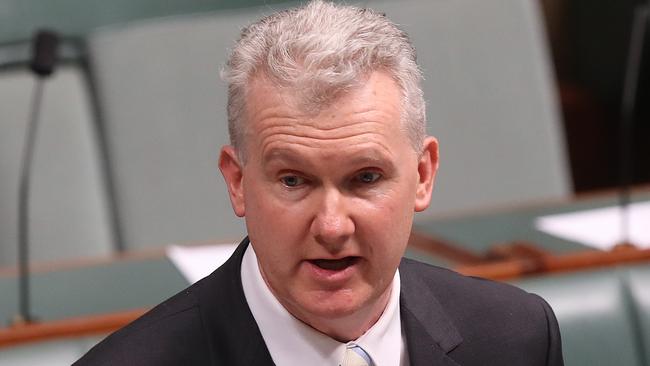Labor's Tony Burke uses Westpac's 23 million breaches of anti-money laundering and terrorism rules to discredit government’s Ensuring Integrity Bill
Labor frontbencher Tony Burke has used the 23 million Westpac breaches to discredit the government’s Ensuring Integrity Bill.

Labor frontbencher Tony Burke has used the 23 million breaches of anti-money laundering and terrorism rules by Westpac to discredit the government’s Ensuring Integrity Bill, arguing that a union could be shut down for “three breaches of paper work.”
The Opposition spokesman on industrial relations warned the passage of the bill would mean there would be no equivalence between the laws for unions and the laws for corporate Australia, arguing that the legislation was an attempt to “bash unions.”
Speaking on Sky News, Mr Burke also said the government had used the case of controversial union official and Victorian CFMEU Secretary John Setka as “clever marketing” in its campaign to build support for the bill.
“Last week we saw a bank be found to have broken the law 23 million times and Mr Morrison’s response was that’s a matter for the board,” Mr Burke said.
“Under this bill, after the amendments, if a union puts its paper work in late or fails to put its paper work in three times the entire organization can be deregistered.
“If you’re a bank 23 million breaches of the law and it’s a matter for the board. Nothing to see here. If you’re a union, three breaches of paper work and the entire organization can be brought down.
“Now, if that’s meant to be corporate equivalence I’m not sure how 23 million equals three.”
Mr Burke said the breaches by Westpac were “serious breaches” given the bank contravened anti-money laundering rules aimed at cracking down on terrorism financing and allegedly helped facilitate child exploitation.
The government will use the final two sitting weeks of parliament to try and pass the Ensuring Integrity Bill which imposes tougher tests for union leaders and sets up a new regime allowing the Federal Court to disqualify officials and cancel the registration of some organisations.
It would also establish a new public interest test for union mergers, which would allow a union’s record of compliance with industrial relations laws to be taken into account when amalgamations were being considered.
Mr Burke also questioned whether it should be up to a court to decide whether a union should be deregistered for trivial breaches of the law.
“If it’s not reasonable, you take it out,” he said. “And there is no corporate equivalence for getting rid of an entire organization for three paper work breaches. That’s what they put in front of the parliament … The reason this bill is in front of the parliament is that they want to bash unions.”
Pressed on his claim about corporate equivalence and whether an individual like Mr Setka would be able to stay on as the chief executive of a large company, Mr Burke said: “The whole John Setka part of this has been very clever marketing from Scott Morrison.”
“It’s not what the bill’s about,” he said. “The whole point of this bill … is because they want to make sure they go after all worker’s organisations. And let’s not forget what the biggest ones are. The biggest union in Australia is the nurses.
“What this law will affect will be the nurses union. It will affect the fire fighters. This bill will affect cleaners. This bill will affect shop assistants.”



